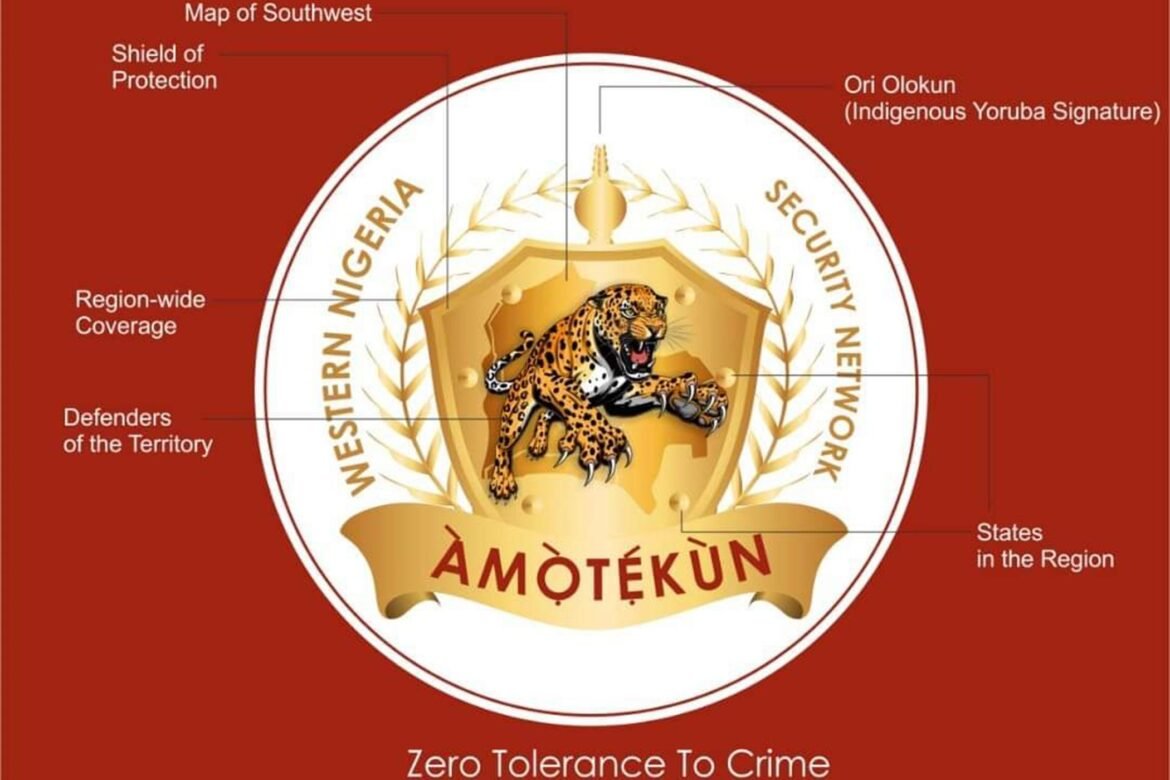Once upon a time, the use of motorcycles as a means of public transportation was an aberration in Nigeria. Economic depression and visionless transportation planning gave us the monstrosity called Okada.
The deterioration of resources, exhaustion of brain power and expansion of corruption will continue give Nigeria solutions that are not fitting for human use.
Amotekun, the contentious outfit designed to protect lives and property in Western Nigeria, is much a solution as the Okada has been – temporarily useful but not appropriate in a decent and well-run society. Such half-baked solutions are a sign of failure, an acceptance of mediocrity and an evidence of the decline in human development.
I grew up in a Nigeria where, as in most civilized societies, public transportation was delivered through sedan taxis, mini buses and trains.
Our cities and towns were filled with colorful Datsun and Toyota sedans supplemented by mini vans. Everyone could afford to travel decently and safely.
In some places, state and municipal governments operated a large public transportation system, using big buses to move people around.
The Lagos State Municipal Transportation Corporation is reminiscent of the advancement of human capacity in those days.
The use of motorcycles as taxis in some remote parts of the country was rare.
Over the years, motorcycles became an acceptable means of commercial transportation. We accepted an eyesore as inevitable. Failure became normal because of bad planning and a lack of foresight
Motorcycles were just a means of private transportation or hobby, as far as most of us knew. There were always stories about the existence of commercial motorcycles around Calabar and Yola, much of it was unverifiable to most of us living in the Western states.
By the mid-eighties, I saw my first commercial motorcycle at the Idiroko border town in Ogun State.
This period coincided with the collapse of the economy and the expansion of corruption under military rule.
As we approached the 90s, the Western states had not only been hit by a rapid shortage of mass transit, we could not have enough Okadas to move people around.
Over the years, motorcycles became an acceptable means of commercial transportation. We accepted an eyesore as inevitable. Failure became normal because of bad planning and a lack of foresight.
The Lagos State Government struggles to deal with this problem today.
The Federal and state governments did not appreciate how wrong, unsafe, problematic and freakish it was to accept a citizen-planned solution to a compound problem.
In hindsight, there is no question that transportation planning and capacity expansion would have provided a better solution than commercial motorcycles and tricycles.
Public administrators are trying to rid the streets of commercial motorcycles, but the original problem has become many times complex. Okada has not only become a way of life, it is a business and a culture.
The enormous resistance that followed the new law in Lagos, in a bid to correct the failure of public policy and administration that allowed okadas to start in the first instance, is an example of what happens when a society closes its eyes on its problems and then plays catch-up.
The state government is just scratching the surface at containing the larger epidemic.
There are still rivers to cross because okadas and kekes are denser in neighborhood streets, where they are still allowed to run.
The problem has run deeper than any law.
Anywhere you go in the world, as long as it is a civilized society, motorcycles are unacceptable for mass transit.
The use of motorcycles and tricycles is a sign of backwardness.
These machines are not solutions; they are symbolic of problems left unsolved.
Such half-baked solutions are a sign of failure, an acceptance of mediocrity and an evidence of the decline in human development
Okada was never necessary for a nation as rich and resourced as Nigeria, but it became unavoidable as a result of corruption and the failure to plan, engineer and implement.
It was a lazy and quick solution to a serious problem, which became part of everyday life.
It is a form of transportation we should not have needed, but one over which our people now riot in order to save.
Why do they protest? Their lives depend on the problem of the problem. When governance fails, half measures rule.
People try to solve problems through self-help when the government is not decisive.
In the absence of electricity supply, the use of generators became the norm.
Every home now has one. As public water supply failed, everybody dug boreholes and wells.
Community vigilantes and private security have been used for decades in place of a failed system of law and order.
These solutions have serious implications for the future.
In Nigeria, we rush to find easy solutions out of a lack of capacity to think through and act.
We seem to abhor planning and pile upon problems even bigger problems.
The latest example of our failure to solve problems properly as a society is the Amotekun.
Although much has been said about the Amotekun in the media, and a lot of praise has gone the way of the governors who conceived it – perhaps rightly so.
The joy that filled many parts of Nigeria over the Amotekunisation of Nigeria is not surprising
However, we are only symbolizing failure while creating even more problems.
Just like the kada, we should never have needed Amotekun to solve rising insecurity.
In our desperation for fixes, we fail to do a critical analysis of the root cause and execute the right and lasting solution.
The joy that filled many parts of Nigeria over the Amotekunisation of Nigeria is not surprising.
The last few years have been really bad for law and order. Domestic terrorism, church bombings, kidnappings, highway robbery and other elements of lawlessness have risen to historic proportions.
Nigerians deservingly cried for a solution as the children of Israel cried for freedom under Egyptian oppression.
Instead of looking towards Canaan to find milk and honey, we cannot see beyond the Red Sea and the desert. We fail to appreciate that the problem cannot be solved by throwing together a bunch of rookies within a few weeks, and expecting them to make us safe.
Though they may provide a temporary relief, this is not the way to create things that last.
The underlying issue is that of an archaic, inefficient, corrupt and centralised police, and it can only be dealt with by leadership through policy, using our collective determination and public pressure to force legislation through.
For the problem, we cannot blame the state governors of the south west.
They had to do anything or face the wrath of their people. It is the National Assembly that has failed to address the problem – the same legislative body that has instead focused on diversionary work, such as the hate and social media bills.
The national lawmakers, known for their bombast only, would not take insecurity seriously until the Amotekun was launched.
If they had held public hearings to understand the problem cleaned up the Nigeria Police, made laws that would break the monopoly of the federal government over law enforcement and appropriated funds to back up state and local government police departments, the Amotekun would never have been born.
More ridiculous is the Buhari administration’s response. Its waged war against Amotekun without having an alternative.
The last few years have been really bad for law and order
The Attorney General, Mr. Abubakar Malami, railed against it, even as other parts of the country designed their own Amotekuns.
Regardless of Buhari administration’s disastrous response, there is something worrying about Nigeria’s preference for half-baked solutions.
Our inability to figure things out properly is astounding and hurtful.
The Amotekun was created without any statute to back it up, and for this, the Federal Government was right to call it illegal.
The Western states are now rushing through laws to give the outfit a form of legality.
The governors did not consult their state legislators before spending billions of naira and hiring hundreds of agents.
All the confusion and contention over the Amotekun aside, people are not asking fundamental questions about its operations.
We do not know who how its agents were recruited and if their backgrounds were properly checked to ensure our safety.
Besides, Amotekun agents could not have been well trained with the few weeks they were thrown together.
We were not told what they will or will not be allowed to do, or if they have the power to arrest or bear arms.
It cannot take much time before such a ragtag body is infected with the Nigerian virus – corruption.
Its agents will start collecting bribes, making false arrests and behaving like their brothers in the other law enforcement agencies.
Do not be surprised if the Amotekun becomes more of a headache than a solution.
We could find ourselves back where we started. If this happens, a Kinihun (lion) will be established to watch the Amotekun (leopard) in the future.
We will keep piling on top of the Nigeria Police Force, inefficient and incoherent agencies such as the VIO, LASTMA, Civil Defence Corps, Traffic Warden Service, NDLEA, EFCC, FRSC and Amotekun, but none of them will solve the problem of law and order effectively.
Half measures such as the Amotekun do not solve any problem.
They are ameliorative and temporary, and can dramatically worsen the problem if care is not taken.








